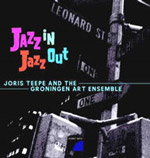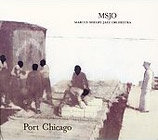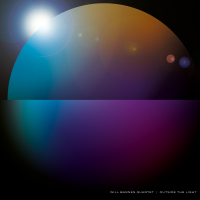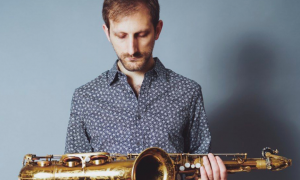Home » Jazz Articles » Interview » Erik Friedlander: Complexity, Simplicity and Arc
Erik Friedlander: Complexity, Simplicity and Arc
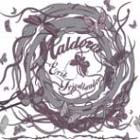 EF: No. It's defunct. I loved what I did with that group, but I kept reading reviews about "chambery —you know, this idea of classical-meets-jazz. I'd hit a point where that was the last thing I wanted to do. That was the genesis of getting Topaz going: I wanted to play with a rhythm section. It's just too easy to do that chamber thing, so that was kind of the end of Chimera and the beginning of Topaz.
EF: No. It's defunct. I loved what I did with that group, but I kept reading reviews about "chambery —you know, this idea of classical-meets-jazz. I'd hit a point where that was the last thing I wanted to do. That was the genesis of getting Topaz going: I wanted to play with a rhythm section. It's just too easy to do that chamber thing, so that was kind of the end of Chimera and the beginning of Topaz.AAJ: Well, it may be too easy, but it's also too easy for music writers to refer to anything that has a cello as "chambery. I suppose reading that word started to make you cringe.
EF: Oh, totally. It's totally exactly the opposite of what I want to do. You know, I was classically trained, but I'm trying to find out what other kinds of music this instrument can play. Especially in these days of crossover artists doing everything italicized or in quotation marks: "jazz, "world —where they're just reading parts, they're not really improvisers. It's not so interesting to me.
AAJ: Tell me about your new band Broken Arm with bassist Kermit Driscoll and drummer Mike Sarin. I think [vibes player] Bryan Carrott's also in the group?
EF: Sometimes.
AAJ: I believe this is a further exploration of playing pizzicato.
EF: Yeah. Although now I'm starting to add bowed to the soloing part of it. But this is a really overtly jazz project, and it's something I've been waiting to do. I've been collecting cello-and-jazz discographies and transcriptions of pieces for years—because I really wanted to do this, I know it's in me, and I did study this music, after all. I worked for years and years to be able to negotiate jazz music and changes and time. I have these skills, but I couldn't find a way to make it feel organic. Then I finally decided—I just want to write a book of music that's from this kind of sunny, Oscar Pettiford pizzicato cello as my launching point [bassist Pettiford dealt with a broken arm by switching to pizzicato, retuned cello, essentially introducing the instrument to the jazz world]—don't do any of his music, but use that as my kind of model.
And also use the small-group Herbie Nichols stuff—I listened to a lot of that. So I figured out how to write medium-tempo tunes and gradually—very gradually—I have written about twenty-five tunes. So if you ever see this concert, you'll see me looking back, but I also look forward. This group is ready to record, and I'm just looking for the right situation for it, because I really feel like I need to get it out there. I do want to establish my cred as someone who can do this, and I think it's a really optimistic kind of joyous project that I really love playing in. We did a very successful tour in Italy and Portugal last November. It's small-group jazz filtered through my own perspective. It's really been a blast.
AAJ: I'm always impressed by your cello technique. It's daunting. But I always get the impression that you make sure your technique is serving your pieces, not vice-versa. I don't think you waste time showing off your chops. Is this just a question of taste or do you ever have to think about not overplaying—do you ever have to reorient yourself more to a piece's content?
 EF: Well, I guess I compare myself to some of the violinists that I know or play with—Zbigniew [Seifert] or Mark Feldman or someone like that. I wish I could make the technique more central, but I don't actually feel like I have it to do it, not at least compared with them. I guess I also feel really strongly about the emotional impact of playing. That's what I'm really about and what I love to do. So I think I try to lead with that, and that leads to things that are less technically virtuosic and more expressive. I was thinking about this today. Because I go to Italy a lot to tour, I'm trying to learn Italian, and I came across this word "improvvisamente —so you think, oh, that means "improvised. But it means "suddenly. And I thought of that word "suddenly, and I thought that's what improvisation should be like: it should be sudden. And I'm going for those moments. If I think back about a gig, I hate deconstructing: "oh, then we did this and you should have done that. I just think about moments. Did we have moments? Did we have enough moments of things happening? If we did, I count that as a good night. That's pretty much the priority..
EF: Well, I guess I compare myself to some of the violinists that I know or play with—Zbigniew [Seifert] or Mark Feldman or someone like that. I wish I could make the technique more central, but I don't actually feel like I have it to do it, not at least compared with them. I guess I also feel really strongly about the emotional impact of playing. That's what I'm really about and what I love to do. So I think I try to lead with that, and that leads to things that are less technically virtuosic and more expressive. I was thinking about this today. Because I go to Italy a lot to tour, I'm trying to learn Italian, and I came across this word "improvvisamente —so you think, oh, that means "improvised. But it means "suddenly. And I thought of that word "suddenly, and I thought that's what improvisation should be like: it should be sudden. And I'm going for those moments. If I think back about a gig, I hate deconstructing: "oh, then we did this and you should have done that. I just think about moments. Did we have moments? Did we have enough moments of things happening? If we did, I count that as a good night. That's pretty much the priority..AAJ: Not a priority at all to have if you're interesting in making art that touches other human beings.
EF: Right. That's the idea. And sometimes I think that that pushes me to try too hard—to try to push things around to make it happen. But I don't think that's such a terrible thing.
AAJ: Okay, you've got this Broken Arm project, and a solo CD recorded that's ready to be released. Are you doing anything else this year?
EF: Gosh, I don't think so. Broken Arm is the next priority to get in the can, and I'm going to be touring with Topaz—I hope. It's very tough, the touring in the States. Probably Europe. Then the solo record comes out in September, so that'll spawn a whole other bit of solo touring. I'm going to do a solo record for [John] Zorn, too, later in the year. Oh, and I have this duo—I'm working with this Italian composer named Teho Teardo. We do stuff together, too, so we have a record coming out.
Selected Discography
Erik Friedlander, Prowl (Cryptogramophone, 2006)
Clogs, Stick Music (Brassland, 2004)
Erik Friedlander, Maldoror (Brassland, 2003)
Erik Friedlander Quake (Cryptogramophone, 2003)
Tim Sparks, At the Rebbe's Table (Tzadik, 2002)
Dave Douglas, Witness (Bluebird, 2001)
Erik Friedlander, Grains of Paradise (Tzadik, 2001)
Ellery Eskin, Vanishing Point (HatOLOGY, 2001)
Erik Friedlander, Skin (Siam, 2000)
Ellery Eskin, Ramifications (HatOLOGY, 2000)
John Zorn, Taboo and Exile (Tzadik, 1999)
Erik Friedlander, Topaz (Siam, 1998)
Dave Douglas, Convergence (Soul Note, 1998)
John Zorn, The Circle Maker (Tzadik, 1998)
Mike Patton, Pranzo Oltranzista (Tzadik, 1997)
Erik Friedlander/Chimera, The Watchman (Tzadik, 1996)
Erik Friedlander/Chimera, Chimera (Avant, 1995)
Dave Douglas, Parallel Worlds (Soul Note, 1993)
Selected Videography
Erik Friedlander, Vanishing Point: a Road Journal (Arconomics, 2005)
Erik Friedlander, Skin (Siam, 2000)
Related Article: Cello Ahead - An Interview with Erik Friedlander (2003)
Photo Credits:
Top photo: Kurt Gellersted
Photo of Topaz: Ashley Thayer
Color Image Friedlander in Performance: Peter Gannushkin
B&W Image Friedlander in Performance: Emiliano Neri
Tags
PREVIOUS / NEXT
Support All About Jazz
 All About Jazz has been a pillar of jazz since 1995, championing it as an art form and, more importantly, supporting the musicians who make it. Our enduring commitment has made "AAJ" one of the most culturally important websites of its kind, read by hundreds of thousands of fans, musicians and industry figures every month.
All About Jazz has been a pillar of jazz since 1995, championing it as an art form and, more importantly, supporting the musicians who make it. Our enduring commitment has made "AAJ" one of the most culturally important websites of its kind, read by hundreds of thousands of fans, musicians and industry figures every month.



